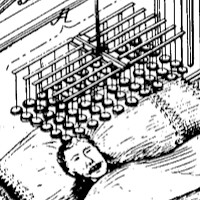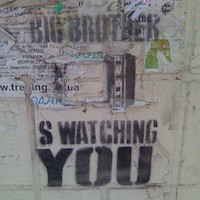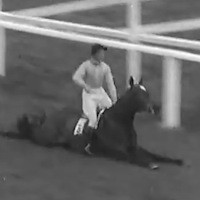Bernard Goetz Becomes a Hero - Maybe

December 22, 1984. Bernhard Goetz, a 37 year old electronics expert, was riding a subway with about 20 other passengers in the car. Four young black men were acting in a rowdy manner and approached Goetz. They asked him for $5 and he told them he had $5 for each of them. He put his hand in his pocket and pulled out an unlicensed .38 caliber revolver. Taking all observers by surprise, he managed to shoot all four youths. He then ran out of the subway car and fled.
Reactions to the shooting were very supportive of Goetz. He quickly became known as a celebrity and a hero. Actress and comedian Joan Rivers sent him a telegram offering to help out with his bail money. T shirts appeared in Manhattan with the words Thug Buster on it, and the Red Beret Guardian Angels collected money to help pay for his defense. His only comment was that he was surprised by his new celebrity status, but he wished to remain anonymous.
As investigators looked into Goetz’s past they learned that he had been previously attacked in a subway station. He was lucky to escape but the injustice of the attack left him furious. That year he applied for a gun permit.
Goetz’s history portrayed him as a law biding citizen who had been beaten by a mugger. The question that plagued the legal system was if his psychological makeup caused him to react reasonably under the current situation. He was carrying an illegal gun, and he may have been punishing the hoodlums from his first mugging. Despite his past, the current situation was undeniably menacing. The group approaching him in the subway had a significant criminal past.
Once investigators sat down to talk to Goetz he did not demand that a lawyer be present. He cooperated with the police and told them most of the information that was used against him during his trial. He never claimed to be a hero or poised himself in a positive light from his actions, but he did say that he hoped something good would result from this. No one could disagree.
At trial Goetz was acquitted of attempted murder, but he was found guilty of possession of an illegal firearm. He served less than one year. After his first trial Goetz became more vocal. He pushed for civilians to carry arms to protect themselves. He suggested the mother of the boy he shot would have been better off if she had an abortion. At trial, the civil jury found in favor of the boy and awarded him $43 million in damages. Goetz immediately declared bankruptcy.
Since then, Goetz has appeared in two small films, campaigned for the legalization of marijuana, and ran for the office of mayor. He has made a variety of tv and radio appearances and opened a store called Vigilante electronics. He still lives in New York City.
Reactions to the shooting were very supportive of Goetz. He quickly became known as a celebrity and a hero. Actress and comedian Joan Rivers sent him a telegram offering to help out with his bail money. T shirts appeared in Manhattan with the words Thug Buster on it, and the Red Beret Guardian Angels collected money to help pay for his defense. His only comment was that he was surprised by his new celebrity status, but he wished to remain anonymous.
As investigators looked into Goetz’s past they learned that he had been previously attacked in a subway station. He was lucky to escape but the injustice of the attack left him furious. That year he applied for a gun permit.
Goetz’s history portrayed him as a law biding citizen who had been beaten by a mugger. The question that plagued the legal system was if his psychological makeup caused him to react reasonably under the current situation. He was carrying an illegal gun, and he may have been punishing the hoodlums from his first mugging. Despite his past, the current situation was undeniably menacing. The group approaching him in the subway had a significant criminal past.
Once investigators sat down to talk to Goetz he did not demand that a lawyer be present. He cooperated with the police and told them most of the information that was used against him during his trial. He never claimed to be a hero or poised himself in a positive light from his actions, but he did say that he hoped something good would result from this. No one could disagree.
At trial Goetz was acquitted of attempted murder, but he was found guilty of possession of an illegal firearm. He served less than one year. After his first trial Goetz became more vocal. He pushed for civilians to carry arms to protect themselves. He suggested the mother of the boy he shot would have been better off if she had an abortion. At trial, the civil jury found in favor of the boy and awarded him $43 million in damages. Goetz immediately declared bankruptcy.
Since then, Goetz has appeared in two small films, campaigned for the legalization of marijuana, and ran for the office of mayor. He has made a variety of tv and radio appearances and opened a store called Vigilante electronics. He still lives in New York City.

Related Articles
Editor's Picks Articles
Top Ten Articles
Previous Features
Site Map
Content copyright © 2023 by Carol Taller. All rights reserved.
This content was written by Carol Taller. If you wish to use this content in any manner, you need written permission. Contact Lane Graciano for details.







